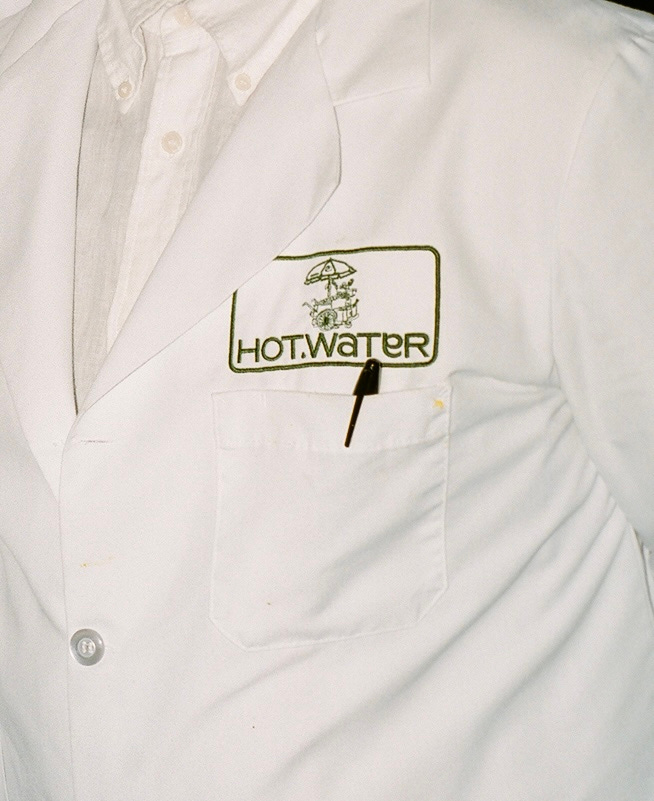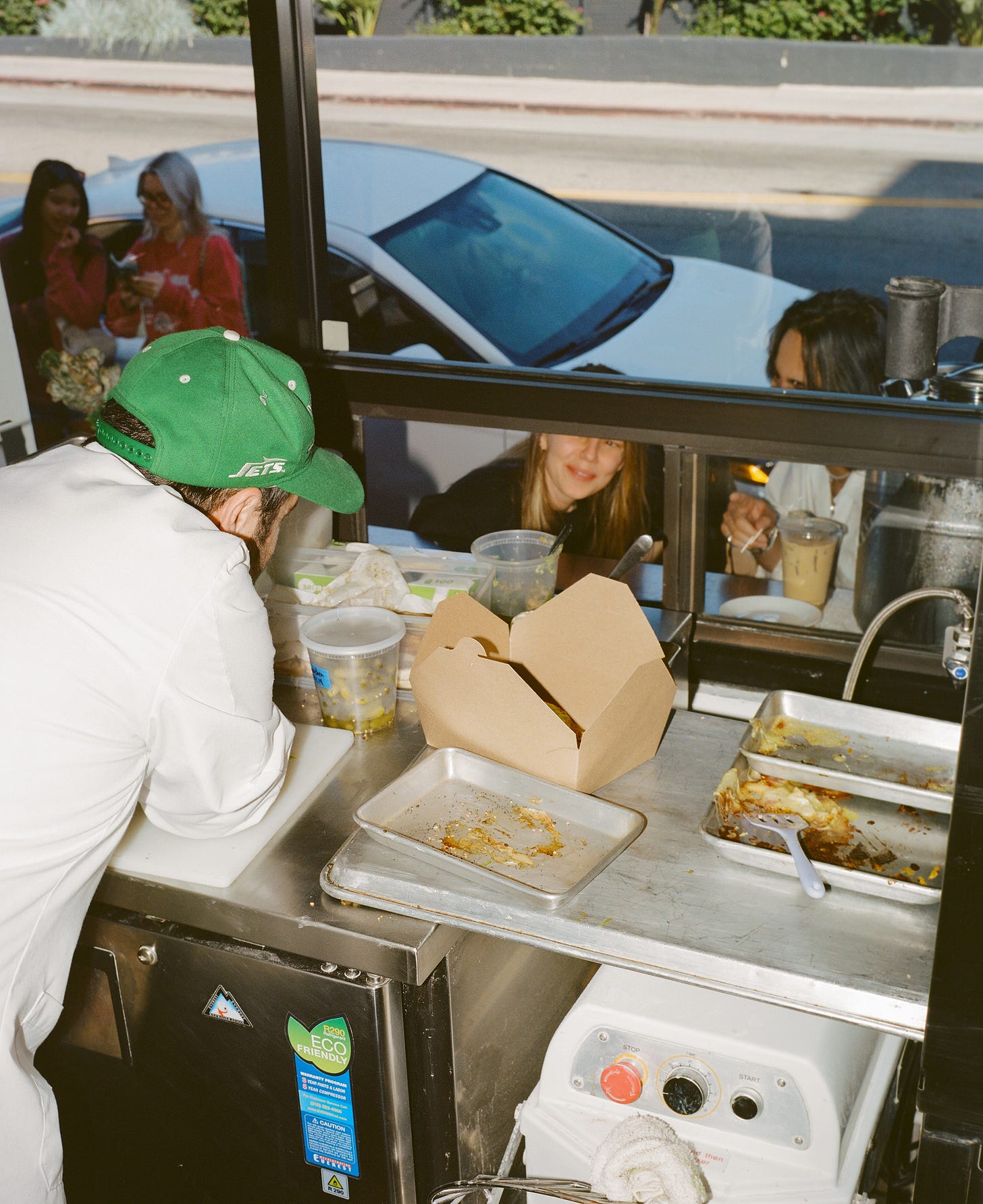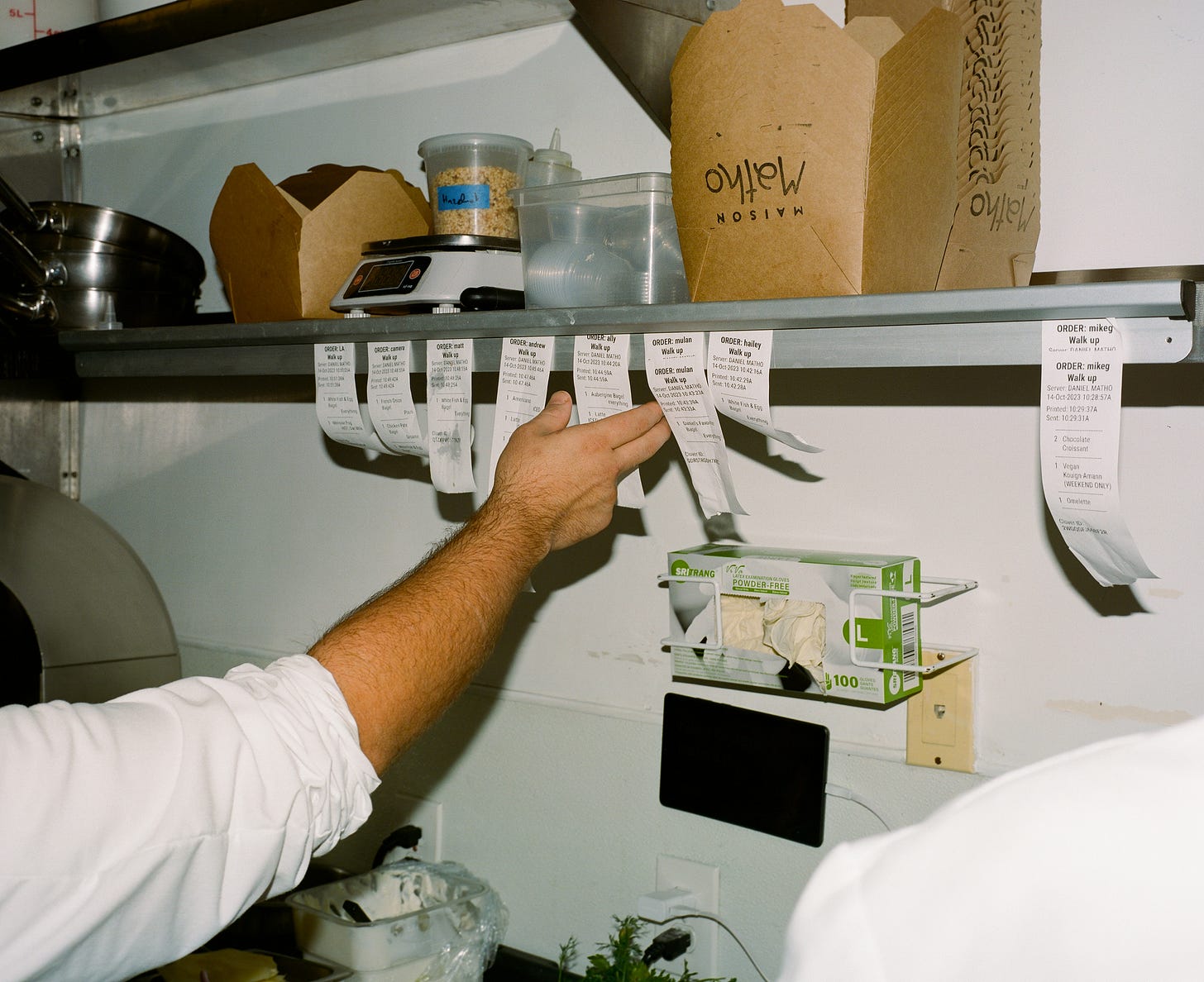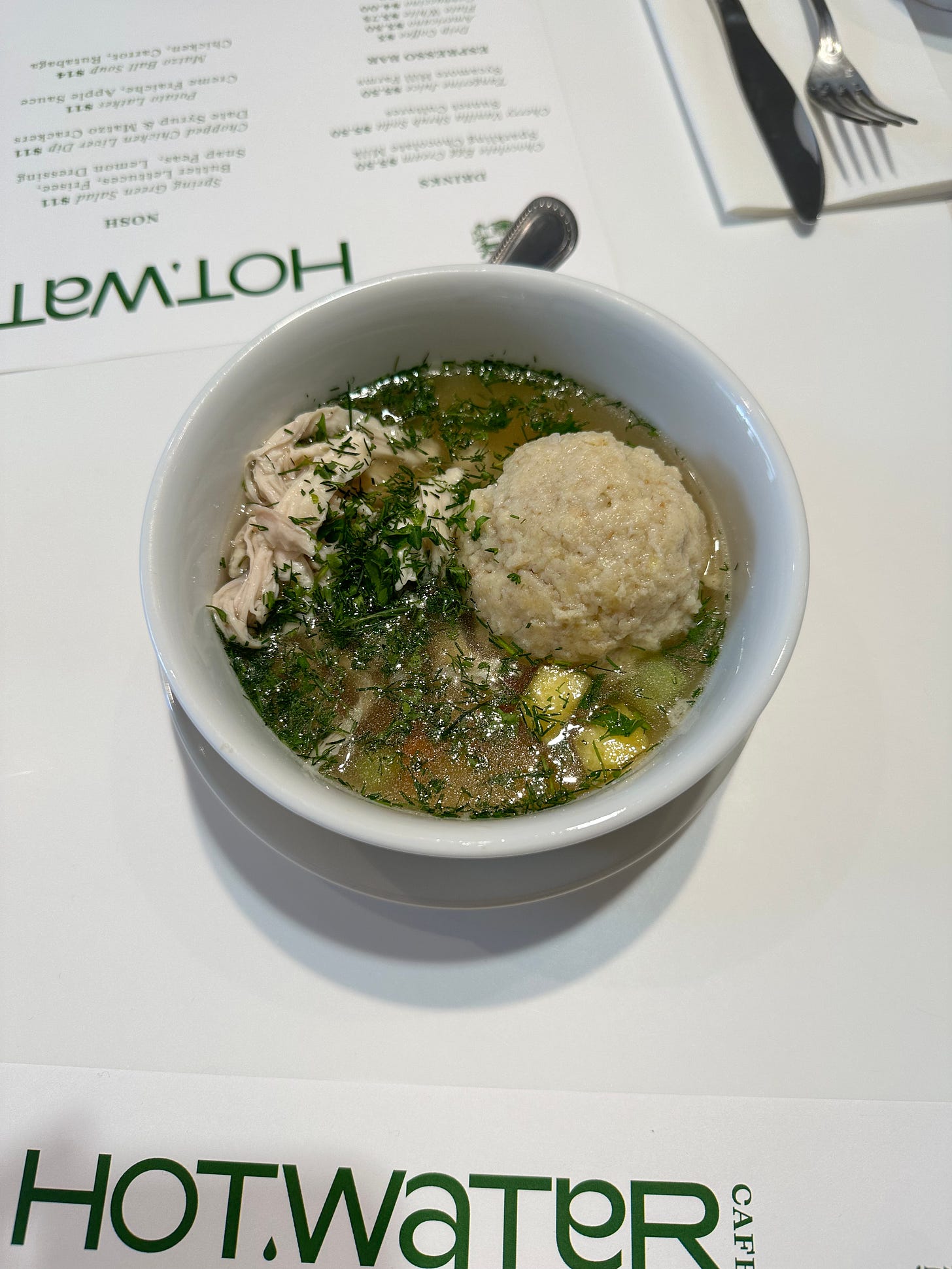Finally, Hot Water Cafe is Bringing Better New York-Style Jewish Food to L.A.
The chef Jesse Furman toys with the possibilities of bagels, matzo ball soup, and black and white cookies.
Like many before him and many after, Jesse Furman is a New Yorker who ended up in Los Angeles. That was 20 years ago now, in 2003, more than enough time to grant him Angeleno status. Yet Furman has always maintained the part of his identity that stems from a childhood spent in Manhattan. When you run into him, say, enjoying a pastry at his friend Zack Hall’s Clark Street Bakery or behind the pass at a number of restaurants around town, he’s likely to be donning a cap representing Zabar’s, the beloved Jewish grocery store on the Upper West Side, or the New York Jets. Recently, he’s been pairing it with a chef coat in the style of the smoked fish mongers at New York City appetizing institutions, such as Russ & Daughters. Emblazoned on the left breast, in forest green, is an illustration of a bagel trolley and the words “Hot Water.”
Hot Water Cafe is Furman’s latest project: a modern Jewish cafe to-be, which he’s been operating as a pop-up since last March. It’s also the chef’s most personal pursuit yet. “I identify as a New York Jew, culturally, not so much from a religious standpoint,” he says. With Hot Water Cafe, he’s honing in on New York Jewish food, perfecting his artisan New York-style bagels and making his own smoked white fish, chopped chicken liver dip, and matzo ball soup.
As he gears up to open his own place, Furman is utilizing pop-ups as more than just a way to develop his repertoire of recipes and get the word out. He also treats them as opportunities to collaborate with friends, fusing his cuisine with theirs for one of a kind dishes. One throughline, now a signature of the Hot Water Cafe pop-up, is Furman’s use of printed New Yorker cartoons in place of parchment paper. Underneath a serving of crispy pastrami-spiced potatoes or an open-faced bagel smeared with whipped cream cheese then topped with smoked salmon and herb oil, the humorous illustrations function like toys found inside of cereal boxes.
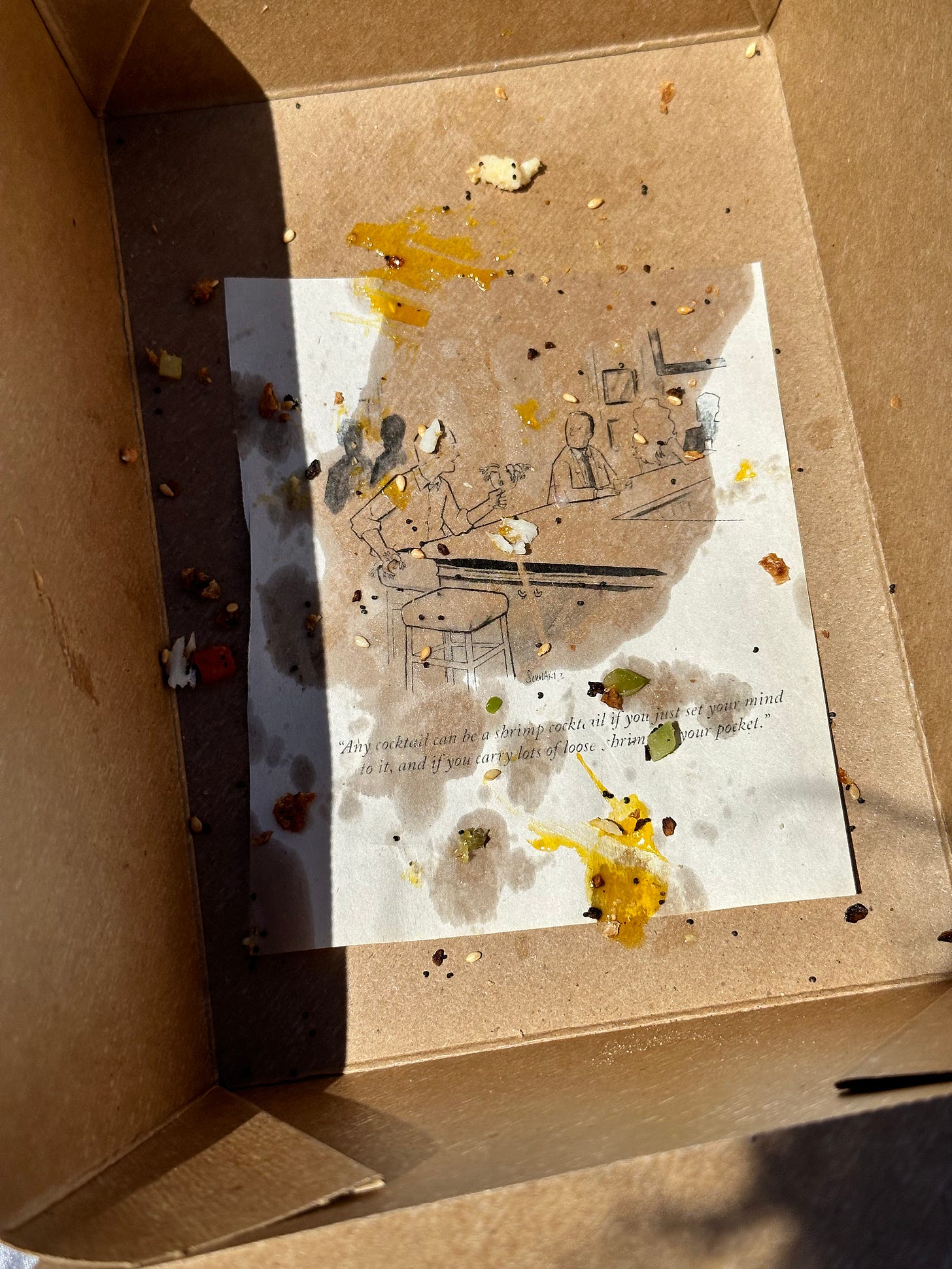
Furman has clocked in alongside Daniel Matho at his French takeout joint Maison Matho, where they served Croque Monsieur, French onion, and chicken pâté bagels. He teamed up with chef Nico de Leon of Lasita to make lechon on rye sandwiches. And he’s popped up at Burgerlords to dish vegan burger sandwiches on caraway bagels and coffee cake milkshakes. It’s possible, Furman says, that some of these items could end up on the menu at Hot Water Cafe’s eventual brick-and-mortar. “The skeleton is Jewish, but as someone that loves to be creative and collaborate, there’s definitely going to be a lot of exciting, unconventional takes on classic dishes,” he says.
Furman didn’t move to L.A. to be a chef. He came to study creative writing and film production at USC. After he graduated, he began taking production assistant and script reader gigs, but he didn’t last long in Hollywood. “I got so fed up with the production industry,” he says. “I realized I wasn’t happy in that world.” As a teenager in New York City, he had worked at a family friend’s restaurant, and in the summers between college years, he cleaned seafood at Citarella, a local high-end grocery chain. It was natural, then, that he found his way into restaurants in Los Angeles.
One of Furman’s first restaurant jobs in L.A. was bartending at Red Medicine, Jordan Kahn’s storied (yet now-closed) fine dining restaurant, which stayed open until 2 a.m. so that cooks across the city could come in after they finished their shifts. “It was a really exciting time to work at that restaurant because we were making really interesting food,” Furman remembers. Not long after, he started his own fried chicken sandwich company called Free Range, which began as a farmers’ market stand then grew into two food trucks, a catering outfit, and an ambitious brick-and-mortar in Newport Beach with a pastry counter and three meal services a day.
Six years in, he burned out. “I just fell apart, it was very intense,” Furman says. “But that was a great learning experience. You learn your limits, what you should do, and what you shouldn’t do.” After the fallout, he landed at Burgerlords as a developmental chef, where he helped create the tofu nuggets and tahini milkshakes. Then came a head chef position at the European-leaning, natural wine-focused Marvin, followed by an opening chef role at the Echo Park sourdough pizzeria Grá. Learning to make wood-fired pizza at Grá, Furman says, intensified his fascination with breadmaking.

He started experimenting with bagels at home in conjunction with his next job. As the culinary director of Brain Dead Studios, he ran Slammer’s Cafe in the back of the streetwear brand’s Fairfax Avenue store and theater. “I started getting bored because we weren’t super busy all the time,” Furman says. “And it’s hard to manage your cost of goods when you have to outsource breakfast pastries and bread.” Before he had a chance to serve his bagels at Slammers, however, he moved on from Brain Dead—and Hot Water Cafe was born.
Bagels, so far, have been the foundation of Hot Water Cafe. Over the last year, Furman has honed his recipe, from nailing the ideal temperature of the water he uses in his dough to finding the right mixer and figuring out his preferred oven. In order to make bagels that are flavorful on their own, he uses local organic flour and a bit of sourdough. “I want them to be light and airy on the inside and crisp on the outside,” he says. Furman’s bagels are a cross between an artisanal bread product and what you’d find at an average New York City shop. His attention to chew is how he keeps them in the New York style. “I like that they require a little bit of jaw work because that’s the nostalgia aspect,” he says.
He has served bagels on platters with local smoked salmon, cream cheese, onions, capers, and farmers’ market tomatoes, straight up with schmears, and more playfully, such as pizza bagels. “At the beginning when I was doing these pop-ups, people were like, ‘You should do a pizza bagel.’ And I was like, ‘No, that’s gross. That’s lame.’ But the more I eat my bagel and retoast it and plate other things on it I’m like, ‘Wow, it actually gets really crisp, it’s really light, and it can be a really fun vehicle for an open-face sandwich,’” he says. Furman is particularly excited about doing a pop-up next month with his friend William Joo of Pizzeria Sei.
But bagels are not the be-all and end-all of Hot Water Cafe. “The pop ups are a means to an end, and the end is to open up a bakery and kitchen that offers a selection of breakfast and lunch items with a full espresso bar and fresh-squeezed orange juice,” Furman explains. He wants to smoke fish in-house, make soups, and roast whole proteins. He wants to do bialys in addition to bagels. He wants to bake black and white cookies that are lemony and pillowy and not overly sweet. He’s thinking of laminating babka to create flakey layers, like a croissant, too. “And I’m excited… so much,” he says with an exhilirated sigh.
Ultimately, Furman wants to give his adopted home of L.A.—and our food-obsessed population, not to mention our Jewish communities—something more (and frankly, something tastier) than what our tried-and-true Jewish delis and old-school bakeries provide. He knows that there is more to be done than what Canter’s, Langer’s, and Diamond Bakery have been doing for decades. Furman points out how compared to New York, which has long standing appetizing destinations like Barney Greengrass and Sable's Smoked Fish, in addition to essential delis such as Katz’s and Mill Basin, plus modern bakeries and cafes—including Breads Bakery, Edith’s, Frankel’s, and Agi’s Counter—Los Angeles is lacking in its Jewish food offerings. Still, he recognizes that Ashkenazi Jews (from Central and Eastern Europe) have deeper roots on the east coast.
He wants to smoke fish in-house, make soups, and roast whole proteins. He wants to do bialys in addition to bagels. He wants to bake black and white cookies that are lemony and pillowy and not overly sweet.
With Hot Water Cafe, Furman’s challenge is to bring the food items he misses from his hometown of New York City to Los Angeles while also taking into consideration the history of Jewish cuisine. He talks about how poor people in pre-World War II Poland, many of them Jews, grew up on dense bagels to keep them full. To make bagels in L.A., however, amongst other contemporary shops like Courage and Layla, there are different factors at play. “A lot of this food is generational,” Furman says. “I have to be clever about connecting the new generation with the old generation while still making it exciting and interesting and palatable.”
There’s an audience here for that. Although there are more Jews in New York City—over a million in fact, which makes it the largest Jewish population of any city in the world—Los Angeles has the second largest Jewish community in the United States, at around 565,000 people. Many of the latter, including Furman and myself, came here from New York. This is reason enough to provide Hot Water Cafe with a strong sense of conviction. And with Furman running point, it makes even more sense: “If I was going to come back and start my own business, it felt right to do something that's really close to home.”



